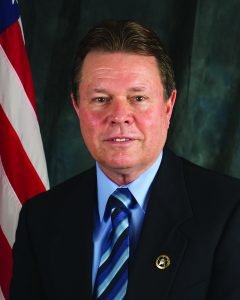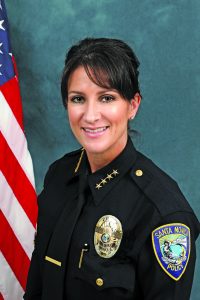
Like it is for many of our members, September 11, 2001, is still very vivid in my memory. At the time, I was the incoming President of IACP.
On September 10, 2001—accompanied by my wife, Denise, and daughter, Jessica—I addressed the New England Chiefs of Police Association in Old Saybrook, Connecticut.
On September 11, we were scheduled to fly home to Florida on an 8:00 a.m. flight out of Boston, Massachusetts; however, the flight plans were changed to instead depart out of Hartford, Connecticut, with a connecting flight through Charlotte, North Carolina. Our air flight route actually crossed over those of the flights that crashed into the Twin Towers, in Pennsylvania, and into the Pentagon. Upon landing in Charlotte, we were the last travelers to deplane, and I knew something had occurred, prompting me to ask the flight attendant what was going on. Her response to me was “We are under attack; we are at war.” Crowds of people gathered around television sets in the terminal and witnessed, as millions of Americans did that day, the terrorist attacks on the United States. Within hours, I observed hundreds of U.S. military personnel occupy the airport and hundreds of planes landing and being parked on the tarmac.
All flights were canceled, and there were no rental cars available. If not for the kindness and personal attention of, at that time, Deputy Chief Glen Mowrey of the Charlotte-Mecklenburg Police Department, my family would’ve been stranded. Glen assigned a sergeant to assist us, and, eventually, I secured a rental van and drove the 24 hours to South Florida. As the days passed, the media revealed that a group of the terrorists had traveled to and resided in South Florida. Little, if any, information was shared from our federal or state partners. The 9/11 incident completely changed my priorities for my year as the president of the IACP. It was decided that the IACP would play a major role in attempting to link federal, state, and local law enforcement together for the purpose of exchanging critical information.
“The 9/11 incident completely changed my priorities for my year as the president of the IACP.”
—William Berger
The first IACP Executive Board meeting of my term immediately convened in New York City, where we saw firsthand the devastation of the 9/11 attack. Thanks to New York State Superintendent Jim McMahon, we were given access to the site of the Twin Towers. We observed the recovery efforts of bodies taken from the rubble of the fallen towers, all of us feeling helpless and enraged by what we were witnessing.
Shortly after that visit, then-IACP Executive Director Dan Rosenblatt and the entire board met to initiate a plan of action. IACP member Peter Modafferi, chief of detectives for the Rockland County District Attorney’s Office and chair of the Policy Investigative Operation Committee, suggested a summit to bring all the major players together under one roof to seriously discuss the exchange of information concerning national security issues. Two important decisions I made were to empower Peter to convene that summit and to appoint then-IACP First Vice President Joe Polisar to carry the baton, knowing that this initiative was not a one-year effort. That summit led to the creation of the Global Justice Information Sharing Initiative and Criminal Intelligence Coordination Council, which involved discussion on the forming of what would later be the FBI Joint Terrorism Task Forces (JTTFs) and state fusion centers, both committed to providing criminal and potential terrorist-related information to all law enforcement partners.
Fast forward 20 years, and, although FBI JTTFs and state fusion centers still exist today, the information being shared is heavily focused on past events and efforts that have thwarted terrorist incidents but seldom includes current impending investigations. Much more attention requiring the disclosing of domestic terrorist perpetrators or groups that are embedded in every community in the United States should be elevated to a top priority and be shared with the law enforcement community as a whole. The recent disclosure of the identities of persons who stormed the U.S. Capitol, including some military and law enforcement personnel, should be a wake-up call for all of us. The importance of sharing criminal and potential terrorist-related information that could save lives and avoid injuries to our most valuable assets—our employees—is crucial.

First, let me say how honored I am to share writing this article with Past President Berger.
He is a consummate professional who can count decades of contributions to our profession among his credits, and I know many have benefited from his wisdom, sage advice, and friendship.
Like Past President Berger, I, too, was on the eastern seaboard on September 11— I was enjoying an impromptu reunion with close high school girlfriends and was having breakfast in the hotel with one when the other ran down—completely disheveled and visibly shaken—to tell us what was occurring. With the rest of the world, we watched in helpless horror as so many innocent lives were lost that day. And we watched with heartfelt accord and a nationwide, unified strength as so many acts of selfless bravery played out from location to location. Amid the pain, anger, and anguish of the day, the images of heroes working to save others still stand out. As Past President Berger points out, the aftermath of 9/11 exposed gaps in the United States’ nationwide intelligence gathering and information sharing networks, and, while the last 20 years have seen dramatic improvements, we still have work to do in order to ensure we are proactively keeping our nation and our communities safe from all threats. We are still working toward communication interoperability, and we still strive for smooth command operations during critical incidents.
“Amid the pain, anger, and anguish of the day, the images of heroes working to save others still stand out.”
—Cynthia Renaud
The events of 9/11 changed our priorities and gave birth to new constructs. The Department of Homeland Security was created. Homeland Security Presidential Directive 5 created the National Response Plan, and Homeland Security Presidential Directive 8 called for the National Incident Management System (NIMS). Fusion centers were stood up, and we began to look at how disciplines outside of law enforcement contributed to this new and somewhat amorphic arena called “homeland security.”
Amid the governmental hubbub of creating processes, laws, tools, and trainings, a small group of people began talking about how we thought about homeland security, and upon what kind of foundation our leaders working in this area should stand. I have heard it said that training teaches one how to use a tool to perform a task, while education teaches one how to use their mind to think about the best way to perform that task. After 9/11, the Center for Homeland Defense and Security (CHDS) at the Naval Postgraduate School was created to educate the current and future leaders working in all disciplines that provide for the safety and security of our communities and nation. I know many of our IACP members are alumni of CHDS programs, and I also believe that their education and subsequent contributions have made us safer and more effective. The IACP, my FBI National Academy experience, and my time at CHDS have provided national and international relationships and best practice sharing that have infused the work done in all three communities in which I was fortunate enough to serve.
Although not a U.S. citizen at the time, my father fought bravely for the Allies during World War II. His reasons for doing so, his beliefs in putting others before himself, his strength, and his calm acceptance of what life demanded of him imprinted on me very strongly when I was a young girl. As he once told me, “Life is 10 percent what happens to you and 90 percent what you make of it.” I believe we, as a nation and as a profession, have lived that 90 percent in the last 20 years.
However, the threats to our world will never end, they will just change. And so, I close with a finding from The 9/11 Commission Report that has resonated with me from the moment I read it nearly two decades ago. The report cited “a failure of imagination” in understanding the growing terrorist threat. The 9/11 attacks happened just over 10 years into my policing career, and it shaped the remaining 20 years of it. For those leading now and for those who will lead into the future, do not fail in your imagination to understand the possible and the potential and to ensure that you and your organizations are as prepared as possible in the continued service to your communities. 🛡
Please cite as
William Berger and Cynthia E. Renaud, “The Way Forward: Two IACP Presidents Reflect on the Lessons of 9/11,” Special Report, Police Chief 88, no. 9 (September 2021): 8–9.


